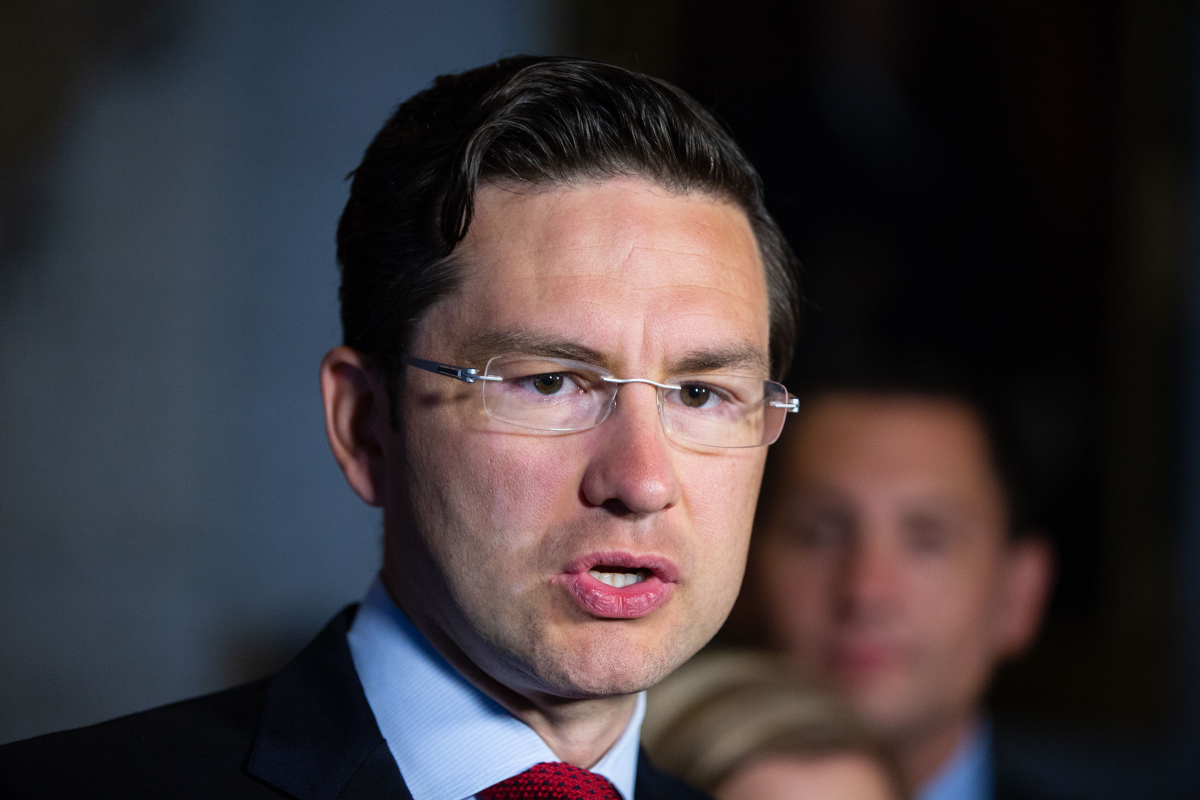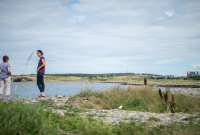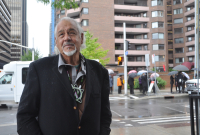Support strong Canadian climate journalism for 2025
Pierre Poilievre homed in on inflation, housing and tax increases during his first question period as leader of the official Opposition. He also fielded several retorts about his past comment that Canadians can “opt-out of inflation” with cryptocurrency.
After nearly 20 seconds of applause from his party, Poilievre launched into his first question Tuesday and called on the government to cancel scheduled “tax increases.” This set the content and tone for most of the followup questions from Conservative MPs.
Minister of Tourism and Associate Minister of Finance Randy Boissonnault responded, first congratulating Poilievre on his first question in his new role and then contrasting the federal government’s plan “to support Canadians who need it most” with “the vision of the Conservative Party and members who don't care about Canadians.”
The new leader of the federal Conservative Party of Canada won’t have the chance to spar with Prime Minister Justin Trudeau until Thursday, when Trudeau returns from the 77th United Nations General Assembly in New York City.
“Our hope on this side of the aisle is that the Conservative Party will support us to get these measures to people,” said Boissonnault, referring to the one-time Canada Housing Benefit top-up, temporary GST rebate hike and new dental benefit for children under 12.
For the most part, Boissonnault responded to numerous similar queries from Conservative MPs by highlighting the new affordability measures tabled in the House of Commons. But as the session wore on, Boissonnault threw a few barbs Poilievre’s way.
Conservative co-deputy leader Tim Uppal commented that the current high cost of living is “caused by this government's out-of-control spending, high-risk economic policies and painful interest rate hikes.”
“Let's be really clear,” said Boissonnault. “The riskiest advice that anybody in the House of Commons has given Canadians over the last six weeks is putting their money into Bitcoin. Had Canadians done that, they would have lost their shirts, they would have destroyed their own personal finances.”
Near the end of the session, Boissonnault dealt another crypto blow when Conservative MP and House leader Andrew Scheer said the government’s new affordability measures will just “get vapourized” by continued inflation.
“I'll tell you what was vapourized: Canadians' savings when they follow the new Conservative leader’s advice to go put money into Bitcoin,” said Boissonnault.
Like other Conservative MPs, Scott Aitchison decried scheduled hikes to the Canada Pension Plan and Employment Insurance premiums, as well as the carbon tax.
The environment minister’s parliamentary secretary Terry Duguid responded to most of the questions focused on the carbon tax. In his response to Aitchison, Duguid referenced Poilievre’s campaign focus on “freedom” — a concept the now-leader did not clearly define.
“I hope the honourable member of the Opposition didn't mean the freedom to pollute and, well, Conservatives want to make pollution free again,” Duguid told the House.
Based on the new highlights of question period, it doesn’t look like the Liberals have started pulling real punches in what experts expect to be a tumultuous session, said Donald Desserud, professor of political science at the University of Prince Edward Island.
“[The Liberals] knew that this was going to be a big moment for Poilievre… One way of deflecting from that is not bringing out all your big guns and giving him the stage that he wants,” Desserud told Canada’s National Observer in an interview.
While this approach could be strategic, he noted it's also possible they aren’t quite organized yet, given Trudeau is out of town.
“We're always assuming that they think these things through … sometimes they don't, they basically make it up as they go along,” said Desserud.
He says as the session progresses, it will be interesting to see which Liberal MPs emerge as question period champions to counter Poilievre’s “aggressive” style. Dominic LeBlanc, minister of intergovernmental affairs, infrastructure and communities, is one possibility.
“[LeBlanc is] a person who I've been watching to see whether he steps up or is asked to step up because I think he's certainly more than capable of taking on a Poilievre in a sort of … blow-for-blow-type question period,” said Desserud.
Natasha Bulowski / Local Journalism Initiative / Canada’s National Observer
This article was corrected to change the incorrect use of "honed" to the intended word: "homed."







Comments
I feel sad and worried about Poilievre. We need politicians who are willing to work together in these challenging times, not ones who are so combative. And of course he denies that we're in a Climate Emergency. He advocates for Milton Friedman style of economics, with its tax cuts, small government, and deregulation, all of which have been proven disastrous in the past (I just read Naomi Klein's The Shock Doctrine this summer). And he is courting with far-right extremists. He is a danger to Canada, just as Trump was/ is a danger to the US and world.
One thing about Poilievre that's clear: He's a pure huckster. He isn't just a fraud, he must know he's a fraud. There are some Conservatives who hold some sort of ideology; when they do, invariably I think it's wrong and harmful, but at least they have a vaguely coherent perspective. So for instance, economically many Conservatives are neoliberals, into "laissez faire" (albeit with subsidies), "small" government (except with plenty of police and military) and low taxes. Some of those even really believe that all this stuff will result in lots of economic growth. It's a terrible position both economically and philosophically, based on some bad math with no relationship to real world economies, but at least it is a position.
But Poilievre has completely contradictory policies. He wants to stop inflation. But he apparently doesn't want to do it the neoliberal way, with the Bank of Canada boosting interest rates. Fine, neither do I. Instead, he blames government spending. This is ridiculous, but let's imagine he believed that. If he believed that, it would be obvious that cutting taxes (to put money in the hands of consumers) works exactly the same as government spending (to put money in the hands of consumers). They are the SAME THING except in the details of who ends up with more money (the Conservative way gives more of it to the rich--huge surprise). But Poilievre talks "Inflation bad, and caused by government spending" with one side of his mouth, and "Cut taxes to give people more money" with the other side. Two bizarrely wrong things that entirely contradict each other, both at the same time. And this is typical of the man.
He's a con man. He has no economic program. He has no principled critique of the Liberals (and it would be easy enough to find one); no matter what someone not on his side does he will just make some nonsense up about why it's bad. Honestly, I don't think even his supporters take him seriously, they just like the way he projects anger. The only people who take him seriously and pretend anything he says makes sense are the media, who should really stop.